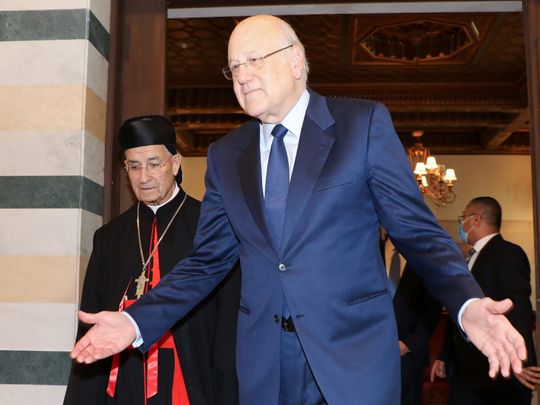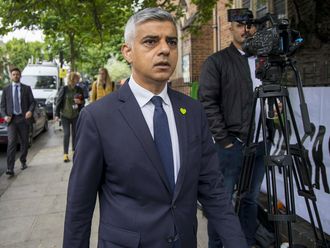
Beirut: Lebanon’s government cannot afford to resign over a growing diplomatic crisis with Saudi Arabia and some Gulf states, a member of a Lebanese crisis group of ministers said on Saturday following a near three-hour meeting over the widening rift.
“The country cannot be left without a government,” due to other pressing matters, and would continue to work to resolve the rift, Education Minister Abbas Halabi said after the meeting.
Lebanon’s president, meanwhile, said he wants good relations with Saudi Arabia, looking to heal a rift with the kingdom. In a tweet Michel Aoun said Lebanon is keen on having the best relations with the Saudis and on strengthening links via bilateral deals.
The row over critical comments made by Lebanese Information Minister George Kordahi about the Saudi-led military intervention in Yemen had spurred calls by some top politicians for Kordahi’s resignation, while others opposed the move.
Saudi Arabia expelled Lebanon’s envoy and banned all Lebanese imports on Friday, and Bahrain and Kuwait followed suit, giving the top Lebanese diplomats 48 hours to exit.
Kordahi’s resignation would have knock-on effects that could threaten Prime Minister Najib Mikati’s coalition government.
But Foreign Minister Abdullah Bou Habib said Mikati’s contacts with officials from a number of states showed opposition to the resignation of the government, formed only last month after a 13-month stalemate.
“They told Mikati, ‘if you are thinking about resignation, take that out of your head,’” he said.
Richard Michaels, deputy head of the US mission in Lebanon, had joined the crisis meeting in Beirut, a US Embassy spokesperson said, declining to comment further.
Mikati had asked Kordahi on Friday to consider Lebanon’s “national interests” but stopped short of asking for his resignation.
Kordahi has been publicly backed by the Iran-backed Hezbollah armed group and has declined to apologise or resign over the comments, which have dealt the worst blow to Saudi-Lebanese relations since Saad al-Hariri’s 2017 detention in Riyadh.
The minister’s political patron, Suleiman Frangieh of the Hezbollah-allied Marada Movement, told a news conference he had refused an offer by Kordahi to resign and would not name a successor to him should he do so.
Yet a group of former Lebanese prime ministers called on Saturday for Kordahi to resign, saying his comments had inflicted a strong blow to relations with Gulf Arab nations.
Fouad Seniora, Hariri and Tammam Sallam, some of the country’s top Sunni politicians, said in the statement that Kordahi’s remarks “harmed Lebanon’s supreme national interest”.
“Remove this minister, who will destroy our relations with the Arab Gulf before it’s too late!” tweeted Walid Jumblatt, the leader of the Lebanese Progressive Party.
“For how long, stupidity, conspiracies and proxies in domestic and foreign Lebanese policies will exacerbate?” he added without elaborating.
Bahaa, the son of ex-Lebanese prime minister Rafik Al Hariri, meanwhile, called for the Lebanese government’s resignation, and not only Kordahi, in order to contain the crisis.
“Thanks to the Kingdom of Saudi Arabia and the Gulf countries for hosting the Lebanese community and drawing a distinction between them and the system of quotas and sectarianism that has caused terrible deterioration in relations between Lebanon and its Arab brethren,” Bahaa said on Twitter.
If Kordahi resigns, ministers backed by Hezbollah and its Amal ally could follow suit at a time when the government is already paralysed by a dispute over an inquiry into the August 2020 explosion that devastated parts of Beirut.
A senior political source told Reuters that the United States and European nations were in contact with Lebanese officials to prevent the government from falling and there were no immediate indications any ministers would resign.
The row comes as Lebanon struggles with a financial crisis dubbed by the World Bank as one of the worst in modern history.
Mikati has been hoping to improve ties with Gulf Arab states strained for years because of the influence wielded in Beirut by the Iran-backed Hezbollah.
Saudi Arabia had already in April banned all fruit and vegetable imports from Lebanon, blaming an increase in drug smuggling that it said Lebanon had failed to address, a ban now extended to all goods.
Great setback
In Cairo, Arab League Secretary General Ahmad Abu Al Gheit said the crisis caused by Kordahi's comments has led to a "great setback'' to Lebanon's relationship with the Gulf countries.
He urged Lebanon's president and prime minister to take ``necessary steps'' to ease the tension, especially with Saudi Arabia. He did not elaborate which steps should be taken.
Abu Al Gheit also called on Gulf officials to review measures that could have negative consequences on Lebanon's already battered economy. -- With inputs from Ramadan Al Sherbini, Correspondent








